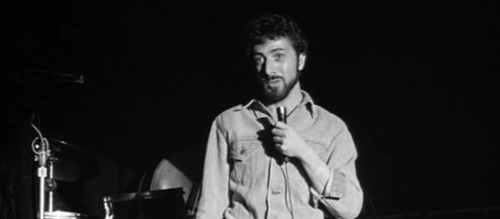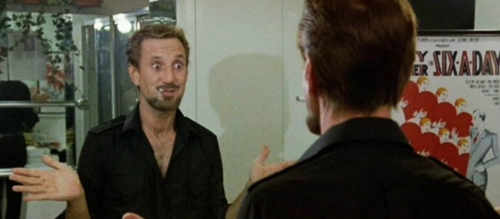Bob Fosse Films Ranked
Dancer, choreographer, director of both stage and screen, workaholic, perfectionist. Bob Fosse was a man of multitudes.
Fosse’s first love was the theatre, directing productions, choreographing unforgettable dance sequences, developing and contributing to Broadway musicals like ‘Sweet Charity’ and ‘Chicago’, the latter of which he co-wrote, choreographed and directed to critical acclaim on its initial run in New York.
His theatre work was often in collaboration with his wife and muse, multi-Tony award-winning actress and dancer Gwen Verdon, who often played the lead in the shows he directed, though she never got to reprise the role in the film adaptations of said shows, even those Fosse himself was in full creative control of. If you’re interested in getting a better sense of their fruitful artistic partnership and their far more tumultuous personal life, the TV miniseries ‘Fosse/Verdon’ starring Sam Rockwell and Michelle Williams is a good place to start.
Since he only came to film directing in the second half of his four decades in showbiz, he didn’t get to put his name to many cinematic works, especially in comparison to many of his contemporary multi-hyphenates, and arguably none of his projects turned out precisely the way he planned them. Winning the Best Director Academy Award for Cabaret in 1972, Fosse won Tonys and Emmys for his work but missed out on many more. The five films he did helm are all mould-breaking, memorable, individualistic works that have only grown in reputation over the decades. Were it not for his fatal heart attack in 1987, aged just 60, his revelatory work might have continued into the 1990s and beyond.
Which of Bob Fosse’s films are the best realisations of his boundless ambitious and singular creative vision? Throw up your jazz hands and grab a bowler hat because in this edition of Ranked, we at The Film Magazine are comparing and contrasting, analysing and evaluating the work of Bob Fosse. These are the Bob Fosse Films Ranked.
Follow @thefilmagazine on Twitter.
5. Lenny (1974)

This is Bob Fosse’s spiky vereté biopic of New York comedian Lenny Bruce (Dustin Hoffman), with particular focus on Bruce’s well-publicised arrest, trial and conviction for obscenity in the late 1960s. As Bruce’s own life was cut tragically short by an overdose he never really hit the big time, so this film acts as a type of epitaph for the shock comedy trailblazer.
The dynamic between Dustin Hoffman and Valerie Perrine as Bruce’s long-suffering wife Honey is always raw and uncomfortable, and both received well-deserved Oscar nominations for their performance. The only major award the film would ultimately take home was a BAFTA for Perrine.
Even if you find Bruce’s acerbic, confrontational stand-up style funny, he’s a hard man to like and an uncomfortable person to spend a couple of hours with. What Fosse is going for with Lenny is a close examination of the concept of free speech, encouraging debate around what we should be able to say and where.
Said battle over the constitutional right to say anything we like is best demonstrated not by the actual courtroom-set scenes that are mostly about the puritanical establishment backlash against Bruce and particularly his stubborn refusal to stop saying “cocksucker” in his routines, but by a slur-filled tirade earlier in the film. This scene of blunt-force satire has him deliver just about every racial insult you can think of like a machine gun directly at his audience and – quite effectively, if inelegantly – argues his point that any word, no matter how offensive, discriminatory or cruel, loses its power through usage in the public stage.
Lenny is a good movie, but you only really need to see it once. And, aside from Fosse’s eagerness to tell a story focused on unlikable people, this is the least interesting of this artist’s big screen projects.
4. All That Jazz (1979)

All That Jazz is a funhouse mirror self-portrait following a Bob Fosse stand-in, Joe Gideon (Roy Scheider), struggling with stress, addiction, giving his fractured family attention, and simultaneously staging an ambitious Broadway show and editing his latest film.
It’s interesting that Fosse ended up casting a recognisable star instead of a more unknown performer with more of a proclivity for controlled physical movements to play him, perhaps seeing a complex portrayal of his fractured personality as more essential to his film than convincingly telling actual dancers how to move, but Roy Scheider really justifies the decision.
Given that it’s all about him and what he was going through in his career and personal life in the early 70s, All That Jazz is Fosse’s most indulgent film by some distance. They don’t say which show he’s putting on, but we’re in on the rehearsals and it’s clearly ‘Chicago’. They don’t say which comedian his film in editing purgatory, ‘The Stand Up’, is about, but it’s definitely Lenny Bruce. At least Fosse doesn’t pretend he’s an angel to work with; he portrays his self-insert anti-hero as a frustrated genius, but one whose unpredictable mood swings, manic energy and indulgence in substances slowly destroys himself and everyone he loves.
All That Jazz is very much tied to Scheider’s barnstorming, almost demonic performance, and despite referencing plenty of real challenges Fosse was facing at the time – barely keeping relationships afloat, clashing with cast members and financiers, editing Lenny and staging ‘Chicago’ simultaneously – the film becomes more exciting in its final act. There are trippy, fantastical flourishes throughout like the glittering white Angel of Death (Jessica Lange) who seems to in equal parts haunt, mock, and beacon of conscience. But in the last stretch, Fosse goes off-piste, very real health scares giving way to imagining what his not-too-distant future might hold, up to and including his death, which of course is told as an elaborate multi-staged song and dance number.
Recommended for you: Damien Chazelle Movies Ranked

